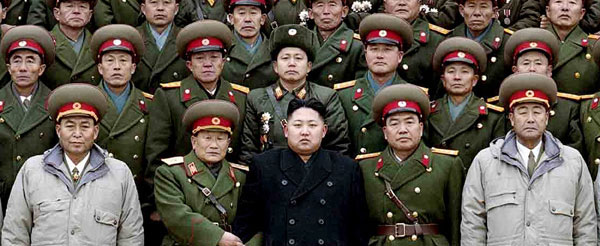by Peter G. de Krassel
Petulant North Korea has not only upset South Korea, Japan and America with its rocket launch on 12.12.12 and nuclear test of early 2013 – but its major patron China. The successful launch of the rocket and nuclear explosion consolidated and cemented the legitimacy of Kim Jung-un at home and established his successor role as an independent punker. He succeeded in putting a satellite into orbit, a feat that long eluded his father and remains a challenge even for rival South Korea.
North Korea’s nuclear brinkmanship is testing China’s newly installed party general, Xi Jinping. Should China continue supplying North Korea with the food and fuel it desperately needs to survive or should it call Kim’s geopolitical bluff? Should China put Kim on notice that China no longer needs North Korea as a buffer state between its border and U.S. ally South Korea, especially now that the U.S. is demanding China tame its belligerent benefactor if America and China are to build a closer working relationship? Besides, what good is a buffer run by an insolent and disobedient punk?
China and the Asia Pacific region will benefit from a united Korea, one that can easily be glued together again and united if my “five party” formula advocated in earlier books is adopted. The alternative? Kim’s nuclear brinkmanship and Dennis Rodman’s basketball diplomacy?
China did join other members of the United Nations Security Council in condemning North Korea’s launch of the rocket as a “clear violation” of U.N. resolutions. This modest step surprised and enraged Pyongyang and set the stage for the nuclear test meant as a warning to China that North Korea will not play the traditional role of a vassal state.
China could easily respond and make it clear that, much as it prefers North Korea to survive and prosper, it can afford to let North Korea implode. After all, the Chinese leadership already sees that sustaining this erratic and unpredictable regime that readily disregards Chinese national interests is more a liability than an asset for Beijing.
A South Korea-led unification of the peninsula is no threat to China. China already enjoys a smoother relationship with the South than with the North. Korean reunification would take at least two decades, during which the U.S., Japan and Russia would need to inject a huge amount of money. Rebuilding and reincorporating North Korea would preoccupy Korea and Japan for a generation. This hardly affects Chinese interests adversely as it continues its own advance to become the world’s largest economy.
If this process unfolds under the auspices of China and the U.S., the U.S. motivation for keeping its own military forces in South Korea would dissipate. A nuclear-armed united Korea should work to China’s advantage as it would reduce the likelihood of U.S. troops remaining in Korea.
Photo: KCNA/AFP/Getty Images

